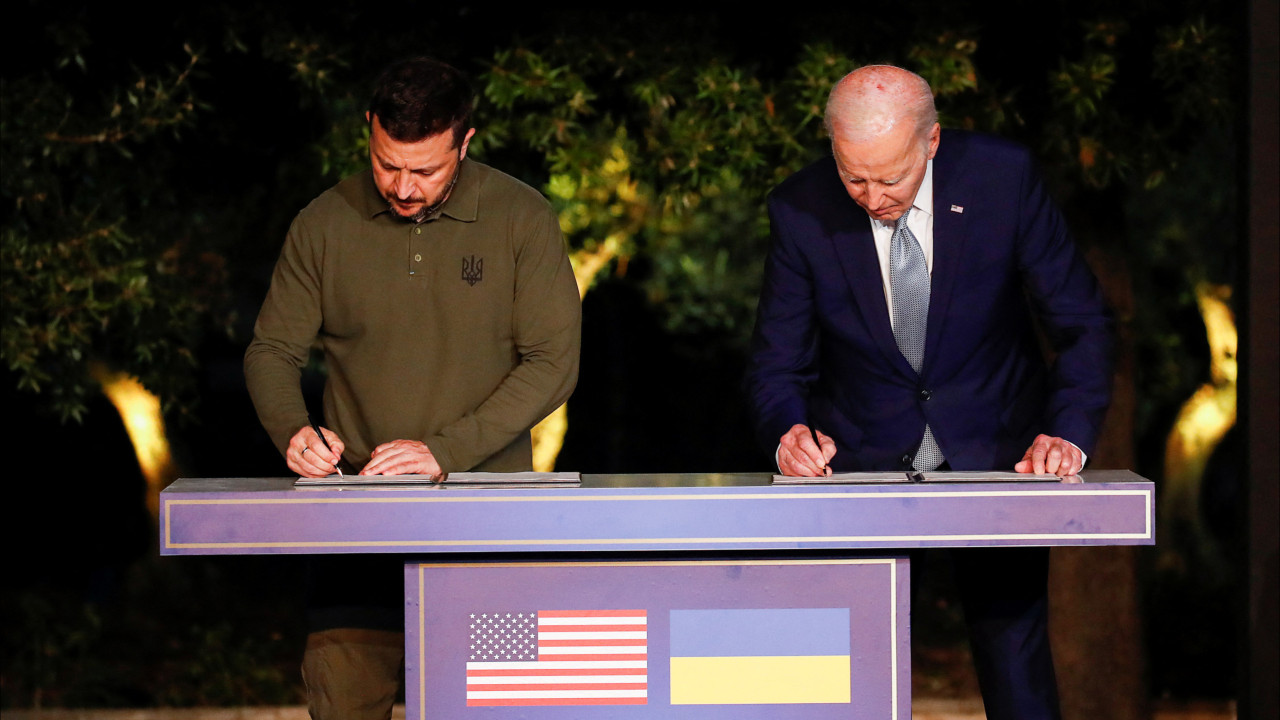
“HToday, the United States expresses a strong signal of its firm support for Ukraine”, announced the Government of the North American President, Joe Biden, in a statement released shortly before the signing ceremony of the agreement, between Biden and his Ukrainian counterpart, Volodymyr Zelensky , invited to participate in the G7 summit in the seaside resort of Bari.
On a blue pulpit with the flags of the United States and Ukraine, Biden and Zelensky signed the document in front of the media and, at the end, shook hands.
The text of the pact commits the United States to hold high-level consultations with Kyiv within 24 hours if Ukraine is attacked again in the future, to “determine next steps and additional defense needs.”
Although it aims to send a signal of strong support from Washington to Kyiv, the agreement could, however, be abandoned by future American leaders, given that the next presidential elections in the United States are in November and the Republican opponent to Biden will be, almost certainly former President Donald Trump.
Zelensky thanked the United States for the security agreement and military aid, said that the pact will pave the way for integration into NATO (North Atlantic Treaty Organization, Western defense bloc), but added: “The question now is to know how much time will last.”
As announced by the White House on Wednesday, the bilateral security agreement between Washington and Kyiv will not directly involve US troops in defending Ukraine against the Russian invasion — a red line drawn by Biden, who fears being drawn into a direct conflict between nuclear-armed powers.
National Security Advisor Jake Sullivan indicated that the agreement provides for the supply of weapons and assistance to Ukraine, similar to agreements signed by Kyiv with other allies.
“Any lasting peace in Ukraine must rest on its own ability to defend itself,” Sullivan stressed.
Also on Wednesday, Kyiv reacted with satisfaction to the announcement of the signing of the bilateral security agreement between the United States and Ukraine.
“We have come a long way in our cooperation with the United States, and the entire team did an excellent job to make this agreement possible,” said the head of the Ukrainian presidential office, Andrii Yermak.
Sullivan called the agreement a bridge to the moment when Ukraine is invited to join NATO — a long-time priority of Zelensky who, following a condition imposed by allies, will first require an end to the war between Russia and Ukraine .
This year’s G7 summit takes place three years after Biden declared, in his first meeting, that his country was returning as a global leader, following the disruptions in Western alliances that occurred when Republican Donald Trump was in the White House.
Russia invaded Ukraine on February 24, 2022, with the argument of protecting the pro-Russian separatist minorities in the east and “denazifying” the neighboring country, independent since 1991 – after the disintegration of the former Soviet Union – and which has been move away from Moscow’s space of influence and get closer to Europe and the West.
The war in Ukraine has already caused tens of thousands of deaths on both sides, and the two belligerents remain unyielding in their territorial positions and are not open to negotiating concessions.
Recent months have been marked by large-scale Russian airstrikes against Ukrainian cities and infrastructure, while Kyiv forces have targeted targets on Russian territory close to the border and on the Crimean peninsula, illegally annexed in 2014.
Already in the third year of war, the Ukrainian Armed Forces have been faced with a lack of soldiers and weapons and ammunition, despite repeated promises of help from Western allies.
Read Also: G7 commits to efforts to avoid escalation in the Middle East

Download our free App.
Eighth consecutive year Consumer Choice for Online Press and elected product of the year 2024.
* Study by e Netsonda, Nov. and ten. 2023 product of the year – pt.com
Source: https://www.noticiasaominuto.com/mundo/2579929/eua-assinam-acordo-de-seguranca-por-dez-anos-com-kyiv



